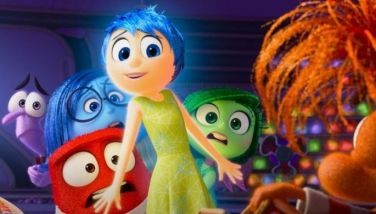The story of us
March 14, 2004 | 12:00am
When Hollywood tirelessly prescribes the same tired old formulae of special effects and actors in custom-made roles, the viewing public’s palate eventually gets jaded. How many more cop-buddy action movies can we stand? How many more doomed love triangles, or coming-of-age teeny-bopper comedy-dramas will it take before we get sick of them? Are there really no new stories that can be told?
For this reason, it’s always refreshing to come across the occasional oddity like Adaptation, Spike Jonez’s brilliant opus of 2003. In it, Nicolas Cage, in what is probably his worst-looking role ever, plays Charlie Kaufman, a fat, balding, loveless sceenwriter plagued by daily anxiety attacks and a severe case of writer’s block. He also plays Charlie’s identical twin Donald, who possesses all of Charlie’s physical shortcomings, but is too busy enjoying himself to notice.
Charlie is commisioned to write a sceen adaptation of the novel The Orchid Thief, and in doing so, gets involved in an affair between an aging, dissatisfied novelist named Orleans (played by Meryl Streep) and the brilliant, toothless orchid hunter Larouche (Chris Cooper), set in the misty, alligator-infested swamps of Florida.
While the audience is busy trying to figure out this premise, Charlie struggles to write his screenplay, agonizing over a blank computer screen night after night while his brother gleefully tries writing, blissfully ignoring all common sense and artistic integrity in writing a cheap, ridiculous serial-killer movie that immediately gets snapped up by Hollywood producers.
This sends Charlie into new lows of insecurity, and he begins to stalk Orleans in elevators and restaurants, and, in a desperate attempt to get started with his script, writes himself into his movie.
At this point, much of is like reality – there are no convenient plot twists, no neat resolutions and definite closure. Charlie himself bemoans Hollywood’s fondness of car chases, of sex and sappy soundtracks, but eventually the last parts of the movie involve all three in rapid succession.
The cleverness of this film lies in its constant attempts to ridicule Hollywood – and itself. It actually requires concentration from the audience, to catch the film industry in-jokes and the nice little touches by Spike Jonez: for example, while most directors would have made a way for the audience to tell Charlie and Donald apart by, say, making them dress very differently, Jonez and Cage manage to differentiate the twins by simple body language.
You root for Charlie while he makes a doomed attempt to ask the waitress of the local coffeeshop out for a date. You will find his constant worrying about his thinning hair, his failure to maintain any romantic relationship, and about his "selling out" to Hollywood endearing. You get drawn into the hopelessness and tedium of Orleans’s marriage, and become engrossed in her affair with the enigmatic botanical thief Larouche, which is at turns tender, dysfunctional and intense.
Then in the last 10 minutes of the movie, everything turns upside down when Charlie stumbles into their affair, and what ensues is a rapid, confusing sequence of car chases, gunfire, a chase through mud and fog in the swamps of Florida, and man-eating gators: Charlie, at last, is caught up in his own little Hollywood-style drama, and when his twin lies dying in his arms after a fatal car accident, Charlie softly sings Happy Together, giving his brother a send-off that could squeeze tears from the most cynical of viewers.
There is, by the way, a real life Charlie Kaufman (unsurprisingly, also behind Being John Malcovich), who wrote himself into the movie. And there is an actual novel called the Orchid Thief, which further blurs the line between film and reality. Watching the end credits of a movie has never been as enjoyable is in Adaptation. This is where the brilliance of the movie lies: it runs its course on so many levels, and is, when you think about it, just built from a real book by a bored screenwriter just having fun with a script.
While the movie makes an effort to not make a point (again, unlike most Hollywqood products), what comes across is simply this: life happens. Between the time when life begins and ends, things wondrous and terrible and strange will occur. When Charlie attends a screenwriting workshop, the facilitator screams at him, "People are born! People die! They fall in love! So many things are happening around you and you tell me that there’s nothing to write about?"
Or a person you’re sharing an elevator with could be secretly following you, and can send you tumbling down into a life you won’t recognize, and your story only could be one of many unfolding.
It’s a multi-layered, colorful, riotous film, one that left me with a delicious headache at the end, and an urge to see it again, just to catch all the nuances I might have missed the first time.
It is a wonderful story, and Adaptation, ultimately, is about stories: the stories we tell, and the stories we play a part in. In the end Donald learns that in order to tell a story, you have to step into your own.
For this reason, it’s always refreshing to come across the occasional oddity like Adaptation, Spike Jonez’s brilliant opus of 2003. In it, Nicolas Cage, in what is probably his worst-looking role ever, plays Charlie Kaufman, a fat, balding, loveless sceenwriter plagued by daily anxiety attacks and a severe case of writer’s block. He also plays Charlie’s identical twin Donald, who possesses all of Charlie’s physical shortcomings, but is too busy enjoying himself to notice.
Charlie is commisioned to write a sceen adaptation of the novel The Orchid Thief, and in doing so, gets involved in an affair between an aging, dissatisfied novelist named Orleans (played by Meryl Streep) and the brilliant, toothless orchid hunter Larouche (Chris Cooper), set in the misty, alligator-infested swamps of Florida.
While the audience is busy trying to figure out this premise, Charlie struggles to write his screenplay, agonizing over a blank computer screen night after night while his brother gleefully tries writing, blissfully ignoring all common sense and artistic integrity in writing a cheap, ridiculous serial-killer movie that immediately gets snapped up by Hollywood producers.
This sends Charlie into new lows of insecurity, and he begins to stalk Orleans in elevators and restaurants, and, in a desperate attempt to get started with his script, writes himself into his movie.
At this point, much of is like reality – there are no convenient plot twists, no neat resolutions and definite closure. Charlie himself bemoans Hollywood’s fondness of car chases, of sex and sappy soundtracks, but eventually the last parts of the movie involve all three in rapid succession.
The cleverness of this film lies in its constant attempts to ridicule Hollywood – and itself. It actually requires concentration from the audience, to catch the film industry in-jokes and the nice little touches by Spike Jonez: for example, while most directors would have made a way for the audience to tell Charlie and Donald apart by, say, making them dress very differently, Jonez and Cage manage to differentiate the twins by simple body language.
You root for Charlie while he makes a doomed attempt to ask the waitress of the local coffeeshop out for a date. You will find his constant worrying about his thinning hair, his failure to maintain any romantic relationship, and about his "selling out" to Hollywood endearing. You get drawn into the hopelessness and tedium of Orleans’s marriage, and become engrossed in her affair with the enigmatic botanical thief Larouche, which is at turns tender, dysfunctional and intense.
Then in the last 10 minutes of the movie, everything turns upside down when Charlie stumbles into their affair, and what ensues is a rapid, confusing sequence of car chases, gunfire, a chase through mud and fog in the swamps of Florida, and man-eating gators: Charlie, at last, is caught up in his own little Hollywood-style drama, and when his twin lies dying in his arms after a fatal car accident, Charlie softly sings Happy Together, giving his brother a send-off that could squeeze tears from the most cynical of viewers.
There is, by the way, a real life Charlie Kaufman (unsurprisingly, also behind Being John Malcovich), who wrote himself into the movie. And there is an actual novel called the Orchid Thief, which further blurs the line between film and reality. Watching the end credits of a movie has never been as enjoyable is in Adaptation. This is where the brilliance of the movie lies: it runs its course on so many levels, and is, when you think about it, just built from a real book by a bored screenwriter just having fun with a script.
While the movie makes an effort to not make a point (again, unlike most Hollywqood products), what comes across is simply this: life happens. Between the time when life begins and ends, things wondrous and terrible and strange will occur. When Charlie attends a screenwriting workshop, the facilitator screams at him, "People are born! People die! They fall in love! So many things are happening around you and you tell me that there’s nothing to write about?"
Or a person you’re sharing an elevator with could be secretly following you, and can send you tumbling down into a life you won’t recognize, and your story only could be one of many unfolding.
It’s a multi-layered, colorful, riotous film, one that left me with a delicious headache at the end, and an urge to see it again, just to catch all the nuances I might have missed the first time.
It is a wonderful story, and Adaptation, ultimately, is about stories: the stories we tell, and the stories we play a part in. In the end Donald learns that in order to tell a story, you have to step into your own.
BrandSpace Articles
<
>
- Latest
- Trending
Trending
Latest
Trending
Latest
Recommended
December 24, 2024 - 12:00am
December 23, 2024 - 12:00am



























